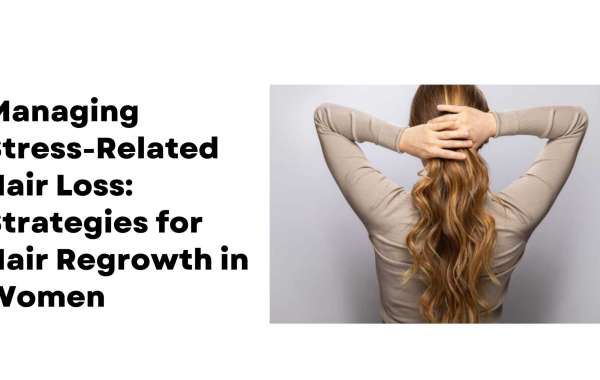Hair loss is a common concern that affects both men and women, and various factors can trigger it. One significant cause of hair loss in women is stress. Managing stress-related hair loss requires a comprehensive approach that addresses both the underlying stressors and the promotion of hair regrowth.
Let’s explore effective strategies to combat stress-related hair loss and promote the best hair regrowth for women.
Understanding Stress-Related Hair Loss
Stress can lead to a number of different hair loss conditions including: telogen effluvium and alopecia areata, plus it can also speed up or cause onset of androgenetic hair loss (otherwise known as female pattern baldness).
Telogen effluvium results from disruption of the natural hair growth cycle. During intense stress, such as traumatic events, chronic stress, or from underlying health conditions, many hair follicles can enter the resting (telogen) phase prematurely. This can result in a noticeable increase in hair shedding, leading to thinning hair and visible hair loss in affected women.
Alopecia areata is characterized by circles or patches of scalp where the follicles have expelled all the hairs in that area resulting in small bald patches. These are normally caused by mental stress such as from work pressure or relationship stress.
Androgenetic alopecia or female pattern baldness can occur in various patterns ranging from concentration in the frontal zones, the temples, the crown or could also present in diffuse generalized thinning across either the top of the head or even the whole scalp. It is characterized but miniaturization of hairs, thinner hairs and less hairs in each follicle which decreases density of hair in affected areas.
Addressing the Underlying Stressors
The first step in managing stress-related hair loss is identifying and addressing the underlying stressors. It's essential to recognize that stress can manifest in various ways and may be caused by factors such as work pressure, relationship issues, financial worries, or major life changes. Engaging in stress-reducing activities like yoga, meditation, regular exercise, and spending time with beloved ones can help alleviate stress and support overall well-being.
A Healthy Diet for Hair Regrowth
A balanced and nutritious diet is crucial for promoting hair regrowth in women. Adequate protein intake is essential, as hair is primarily composed of a protein called keratin. Incorporating foods rich in biotin, zinc, iron, and vitamins A and C can also support hair health. Add leafy greens, nuts, seeds, fish, eggs, and dairy products to your diet to provide essential nutrients for hair growth. Try to limit your intake of carbohydrates and in particular simple sugars like soda’s, juices and processed foods.
Hair Care Practices for Regrowth
To facilitate hair regrowth, it's crucial to adopt gentle hair care practices that minimize further hair breakage and damage. Avoid tight hairstyles that put stress on the hair follicles, as well as excessive heat styling and chemical treatments. Use a wide-tooth comb to mildly detangle hair, and opt for sulfate-free, nourishing hair products to maintain health. Its important to understand however that the objective for these recommendations is to minimize further damage to the hair already outside the scalp.
Topical Treatments for Hair Regrowth
It’s important to understand that the causes of hair loss are internal and deep inside your body. This means that anything applied topically which is not a prescription ingredient cannot penetrate the skin and treat what is actually causing the problem. Don’t fall victim to marketing of cheap online products like shampoos, conditioners, oils, etc. Generally, if the price suggests its too good to be true it is too good to be true.
Supplements for Hair Health
Be very wary of companies selling supplements to help promote hair regrowth in women. Recent clinical studies demonstrate that nutrients from commercial supplements are not absorbed well during digestion and have limited benefit. You are much better taking your nutrients from whole fresh foods.
Reference: https://www.researchgate.net/publication/279019758_Stop_Wasting_Money_on_Vitamin_and_Mineral_Supplements_vol_159_pg_850_2013
Biotin in particular, while widely believed to help with hair loss, has been clinically proven not to and over supplementation in fact can cause serious health issues. Reference: https://karger.com/sad/article/3/3/166/291279/A-Review-of-the-Use-of-Biotin-for-Hair-Loss.
Stress Management Techniques
In addition to addressing stressors, incorporating stress management techniques into your daily routine can positively impact hair regrowth. Mindfulness practices, such as deep breathing exercises, progressive muscle relaxation, and guided meditation, can help reduce stress and promote a sense of calm.
Seeking Professional Help
If you're experiencing significant hair loss or continuing hair loss over time without improvement, it’s important to consult a medical hair loss specialist. Please note that I said here hair loss specialist, not skin or hair specialist. Hair loss as mentioned above is caused by conditions (even stress) inside the body and hair loss is a symptom. Specialist in skin and hair are not trained to review blood work and assess the impact of physical stress, immune function, nutrition, genetics and more on the blood supply which feeds ou hair follicles and hence hair growth. A hair regrowth doctor can review blood work to determine your underlying causes of hair loss and recommend appropriate treatments or lifestyle adjustments for the best hair regrowth for women.
The End Note
Managing stress-related hair loss requires a holistic approach that addresses both the underlying stressors and the promotion of hair regrowth. You can support hair health and encourage regrowth by identifying and managing stress triggers, adopting a healthy diet, and using gentle hair care practices. Incorporating topical treatments, supplements, and stress management techniques can also significantly promote the best hair regrowth for women.
NOTE: “Remember that hair regrowth takes time, and seeking professional help can provide valuable insights and guidance on the most effective strategies for your individual needs. With a comprehensive approach to managing stress-related hair loss, you can work towards healthier, fuller hair and a sense of overall well-being.”








